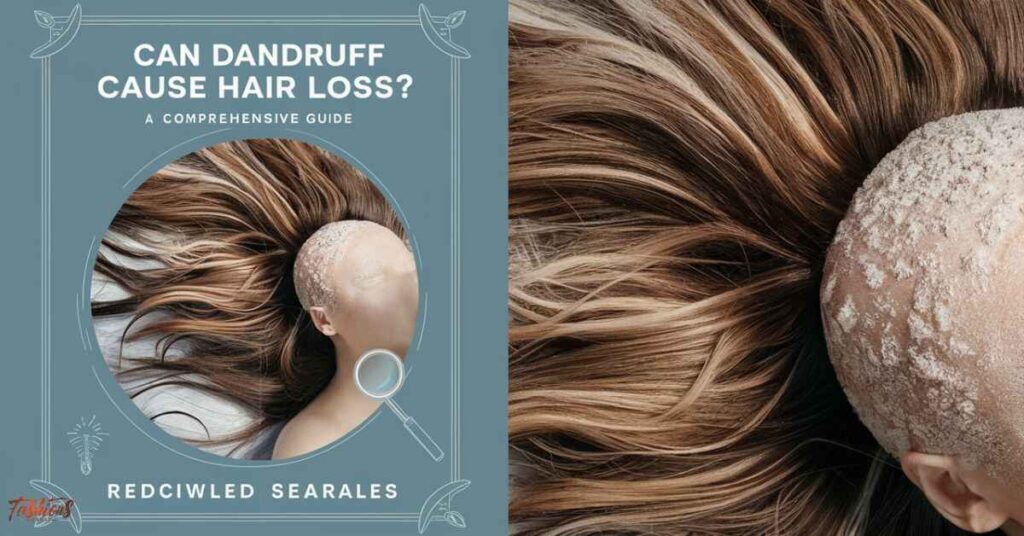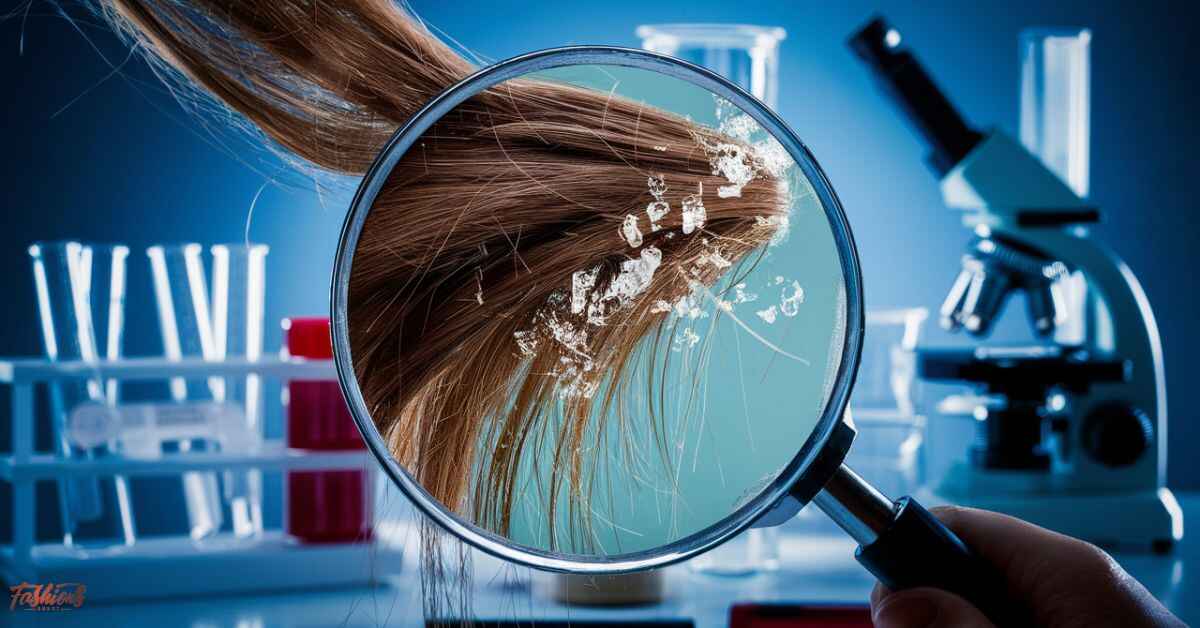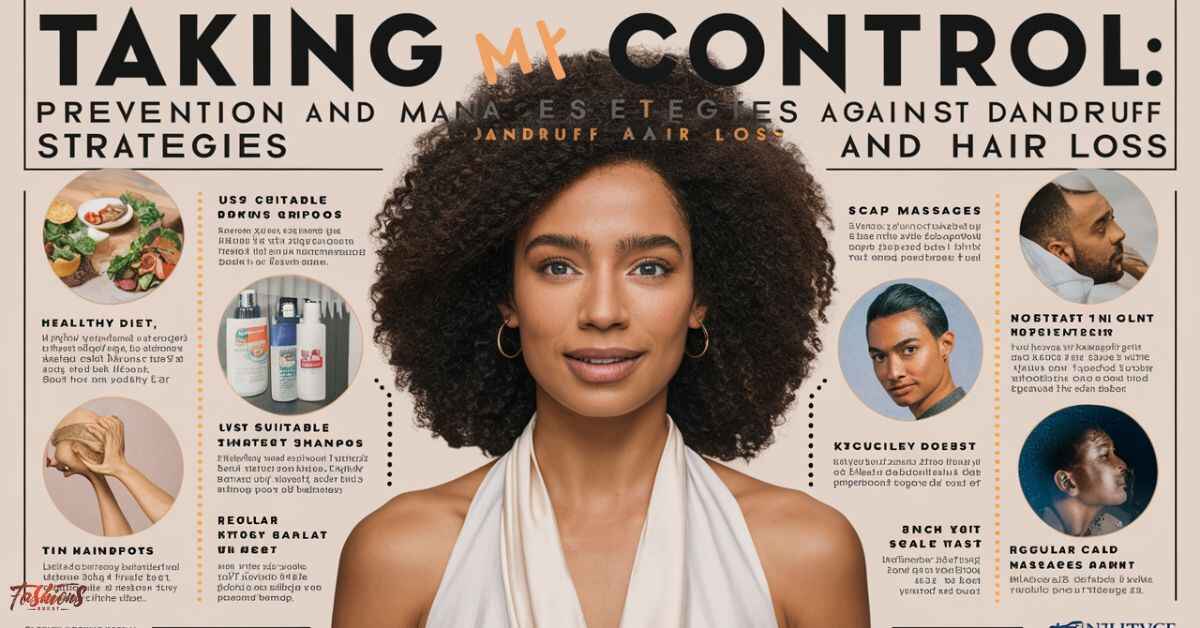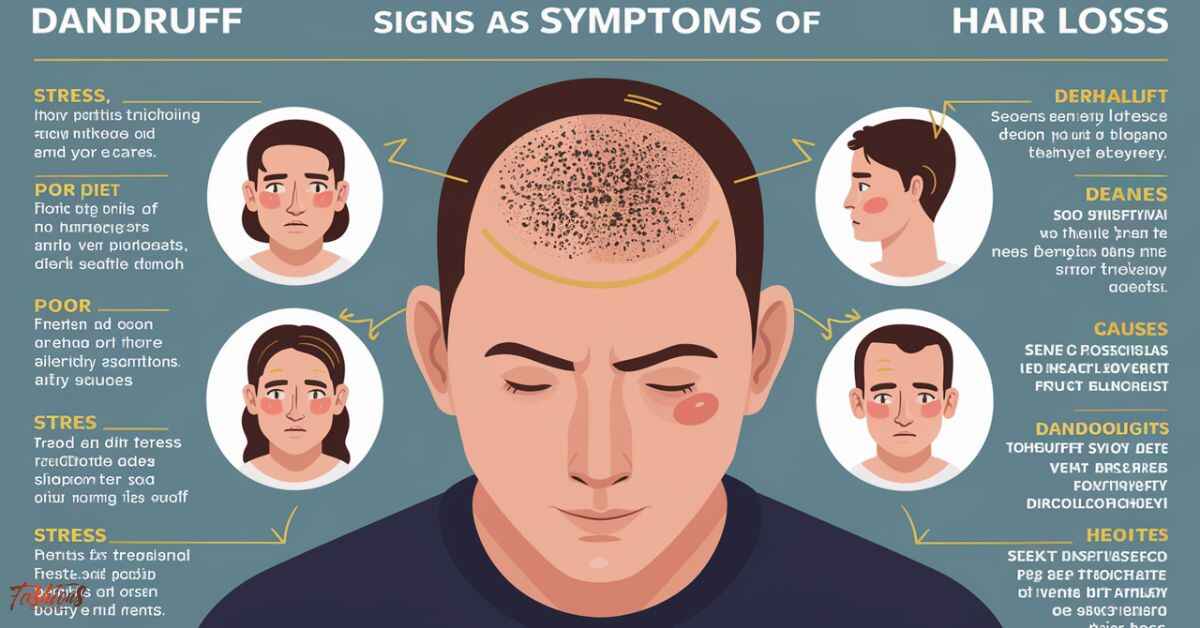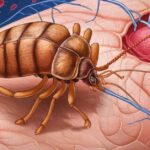Have you ever wondered if those pesky white flakes could be more than just a nuisance? Dandruff is a common scalp condition, but could it potentially lead to something more concerning? Hair loss.
While dandruff itself may not directly cause hair loss, the connection between the two is undeniable. In this comprehensive guide, we’ll dive deep into the relationship between dandruff and hair loss.
We’ll explore underlying causes, risk factors, and effective solutions to tackle both issues simultaneously. So, let’s start by understanding what dandruff really is and how it can potentially contribute to thinning locks.
Dandruff 101: A Crash Course
Dandruff is characterized by white or yellow flaky buildup on the scalp. It’s a common condition affecting millions worldwide. The main causes include:
- Fungal overgrowth: A type of fungus called Malassezia can break down oils on the scalp, leading to dandruff.
- Dry skin: Lack of moisture can cause excessive shedding of dead skin cells, resulting in flakes.
- Product buildup: Certain hair products can clog pores and irritate the scalp, triggering dandruff.
Common symptoms include:
- Itchiness
- Visible flaking
- Redness and irritation
While dealing with dandruff can be frustrating, it’s usually manageable with proper care. However, if left untreated, it can potentially contribute to hair thinning or shedding. Let me share a personal anecdote – I once struggled with severe dandruff for months, constantly finding flakes on my shoulders. Little did I know, it was taking a toll on my hair health.
The Dandruff-Hair Loss Connection: Uncovering the Truth
Let’s clarify something important: dandruff itself doesn’t directly cause hair loss. However, severe, untreated dandruff can contribute to hair thinning or shedding through various mechanisms:
- Inflammation and damage to hair follicles:Chronic inflammation from dandruff can impair the hair growth cycle and damage follicles, leading to weaker, thinner hair strands.
- Excessive scratching and irritation:The intense itching associated with dandruff often leads to vigorous scratching, which can physically damage hair follicles and cause breakage.
- Fungal overgrowth (Malassezia):The same fungus responsible for dandruff can disrupt the scalp’s microbiome, potentially interfering with healthy hair growth.
- Psychological stress:Dealing with dandruff and hair loss can be emotionally taxing, and stress is known to exacerbate both conditions.
With this understanding, let’s explore some underlying conditions that can simultaneously trigger dandruff and hair loss.
Conditions Linked to Both Dandruff and Hair Loss
Certain medical conditions can cause both dandruff-like symptoms and hair loss. Here are a few examples:
Seborrheic Dermatitis
- A chronic inflammatory skin condition characterized by red, scaly patches and dandruff-like flakes.
- Can lead to hair thinning or shedding, especially in severe cases.
- Treatment options include medicated shampoos, topical creams, and lifestyle changes.
Scalp Psoriasis
- An autoimmune disorder that causes red, itchy plaques on the scalp.
- Severe cases can damage hair follicles and impair growth.
- Phototherapy, oral medications, and topical treatments may help manage symptoms.
Fungal Infections (Tinea Capitis/Ringworm)
- Fungal infections like ringworm can cause intense itching, blisters, and hair loss in patches.
- Antifungal treatments are necessary to address the underlying issue.
- Left untreated, these infections can lead to permanent hair loss or scarring.
Folliculitis Decalvans
- A rare inflammatory condition that destroys hair follicles.
- Characterized by red, itchy scalp similar to dandruff.
- Aggressive treatment is required to prevent permanent hair loss.
For each condition, seeking proper diagnosis and treatment from a healthcare professional is crucial. Ignoring the underlying issue can exacerbate both dandruff and hair loss.
Read this blog: Is Head & Shoulders Bad For Your Hair? The Truth Revealed
Taking Control: Prevention and Management Strategies
While the link between dandruff and hair loss can be concerning, there are steps you can take to maintain a healthy scalp and prevent further issues:
- Maintain good scalp hygiene:Regular washing with a gentle, anti-dandruff shampoo is key. Look for active ingredients like zinc pyrithione, selenium sulfide, or ketoconazole, which can help control fungal overgrowth and flaking.
- Manage underlying conditions:If you suspect an underlying condition like seborrheic dermatitis or psoriasis, seek professional help. Proper diagnosis and treatment can effectively manage symptoms and prevent further hair loss.
- Adopt a healthy lifestyle:Reducing stress through relaxation techniques, maintaining a balanced diet rich in hair-friendly nutrients (like biotin, iron, and vitamin C), and avoiding tight hairstyles or excessive heat styling can all contribute to scalp and hair health.
Here’s an example of a nutrient-rich meal that can benefit your scalp and hair:
- Grilled salmon (rich in omega-3 fatty acids)
- Spinach salad with avocado (loaded with vitamins and healthy fats)
- Quinoa (a great source of plant-based protein and iron)
By incorporating these prevention and management strategies, you can take control of your scalp health and minimize the risk of dandruff-related hair loss.
When to Seek Professional Help
While home remedies can be effective for mild dandruff, some signs indicate it’s time to consult a dermatologist or trichologist (a specialist in hair and scalp disorders):
- Severe, persistent dandruff: If over-the-counter treatments aren’t providing relief, it could signify an underlying condition.
- Excessive hair shedding or thinning: Sudden or significant hair loss requires professional evaluation.
- Bald patches or cratering of the scalp: These can be signs of more serious conditions like alopecia or scarring hair loss.
- Intense itching or pain: Severe discomfort or tenderness on the scalp should be addressed by a professional.
Early intervention is crucial to prevent permanent hair loss or scarring. A qualified professional can rule out underlying conditions and provide a customized, effective treatment plan.
“Early detection and treatment are key to preventing further hair loss and preserving existing hair follicles.”
(Dr. Sarah Jackson, Dermatologist)
Don’t hesitate to seek professional help if you have concerns about your scalp or hair health. Being proactive can make a significant difference in the long run.
Also read: Can Bed Bugs Live In Your Hair?
Frequently asked questions
Will hair loss from dandruff grow back?
Yes, hair typically grows back once dandruff is treated and the scalp is healthy again. Maintaining proper scalp care can prevent further hair loss.
How do you stop dandruff and hair loss?
To stop dandruff and hair loss, use an anti-dandruff shampoo regularly and maintain a healthy scalp care routine. Ensure a balanced diet and avoid stress for better hair health.
Can dry scalp cause hair thinning?
Yes, a dry scalp can cause hair thinning by weakening hair follicles and leading to breakage. Keeping the scalp moisturized can help prevent this issue.
How to remove dandruff permanently in one wash?
Permanent removal of dandruff in one wash is unrealistic; consistent treatment is necessary. Use a medicated anti-dandruff shampoo regularly for effective results.
What kills dandruff faster?
Medicated shampoos with ingredients like ketoconazole, selenium sulfide, or zinc pyrithione kill dandruff faster. Regular use is key to effectively managing and reducing dandruff.
Does hot water cause dandruff?
Yes, hot water can cause dandruff by drying out the scalp and stripping it of natural oils. Use lukewarm water to avoid irritating the scalp.
Conclusion
Throughout this comprehensive guide, we’ve explored the complex relationship between dandruff and hair loss. While dandruff itself doesn’t directly cause hair loss, its indirect role and potential to exacerbate certain conditions cannot be ignored.
We’ve discussed underlying conditions like seborrheic dermatitis, scalp psoriasis, and fungal infections that can contribute to both dandruff and hair thinning. Additionally, we’ve covered preventative measures and treatment options to maintain a healthy scalp and minimize the risk of dandruff-related hair loss.
Remember, addressing dandruff promptly and seeking professional help when needed is crucial. By taking a proactive approach and incorporating the strategies discussed, you can take control of your scalp and hair health.
Don’t let dandruff and hair loss dictate your confidence. Embrace a holistic approach, and prioritize your overall well-being. Your scalp, and your hair, will thank you.

